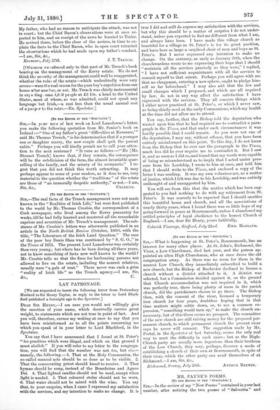LAY PATRONAGE.
[We are requested to insert the following letter from Prebendary, Harland to Sir Henry Taylor, in reply to the letter to Lord Blach- ford published a fortnight ago in the Spectator.] DEAR SIR HENRY,—I am sure you would not willingly give the sanction of your name, which deservedly carries great weight, to statements which are not true in point of fact. And you will, therefore, excuse my writing at once to say that you have been misinformed as to all the points concerning me which you speak of in your letter to Lord Blachford, in the Spectator.
You say that I have announced that I found at St. Peter's ." ten practices which were illegal, and which on that ground I must abolish." If you will refer to my letter to the congrega- tion, you will find that the number was not ten, but siz- namely, the following :-1. That at the Holy Communion, the so-called manual acts should be so done as to be visible. 2. 'That the consecrating priest should kneel to receive. 3. That ilyrans should be sung, instead of the Benedictus and Agnns Dei. 4. That lighted candles should not be used, except when light is needed. 5. That coloured stoles should not be worn, 6. That water should not be mixed with the wine. You say that, to your surprise, when I came I expressed my satisfaction *with the services, and my intention to make no change. It is
true I did and still do express my satisfaction with the services, but why this should be a matter of surprise I do not under- stand, unless you expected to find me different from what I am, and always have been. I have made this village church as beautiful for a village as St. Peter's is for its great position, and have here as large a surpliced choir of men and boys as St. Peter's. But I never expressed any intention to make no change. On the contrary, as early as January 30th, when the churchwardens wrote to me expressing their hope that I should. "maintain all the services precisely as they were," I replied, "I have not sufficient acquaintance with all the services to commit myself to that extent. Perhaps you will agree with me that no clergyman, entering a new sphere, ought to pledge him- self so far beforehand." I may also add that the few and small changes which I proposed, and which are all required by law, do not in any way affect the satisfaction I have expressed with the services. They all concern things which I either never practised at St. Peter's, or which I never saw, as being chiefly used at the early Communions, which my health at the time did not allow me to attend.
You say, further, that the Bishop told the deputation who waited upon him that he had required me to contradict a para- graph in the Times, and that under such circumstances it was hardly possible that I could remain. As you were not one of the deputation, I may say, without offence, that you have been entirely misinformed on this point. To this day, I do not know from the Bishop that he ever saw the paragraph in the Times, much less did he ever require me to contradict it. But I saw it, and as soon as I did so, and found that my words were capable of being so misunderstood as to imply that I acted under pres- sure from his Lordship, I wrote to him at once, and told him that I should write to the Times, and enclosed a copy of the letter I was sending. It was my own volunteer act, as a matter of justice, which I felt was due to his Lordship, and was entirely unthought of and unsuggested by him.
You will see from this that the motive which has been sug- gested to you had nothing to do with my retirement from St. Peter's. It was scarcely to be expected that I should sacrifice this beautiful home and church, and all the associations of nearly thirty years, when I found there was so little hope of my going forward in peace at Bournemouth, unless I abandoned my settled principles of loyal obedience to the honest Church of England.—I am, dear Sir Henry, yours faithfully,
Colwich Vicarage, Stafford, July 22nd. EWD. HARLAND.


































 Previous page
Previous page